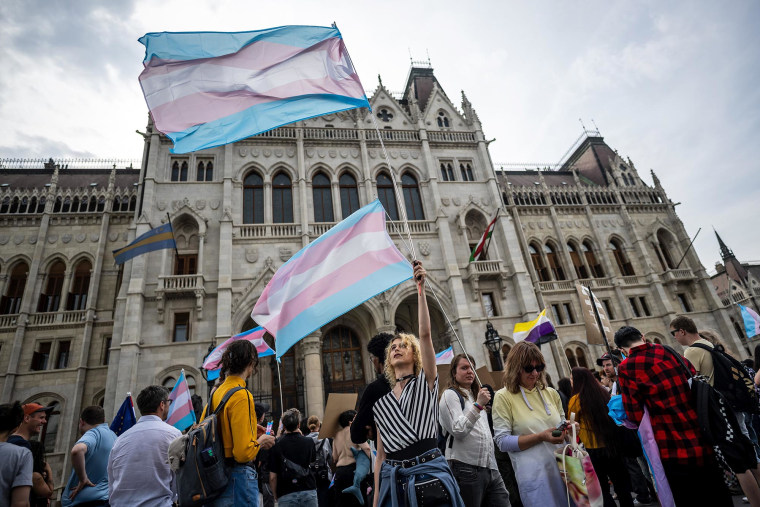NYC, San Francisco and other U.S. cities cap Pride Month with a mix of party and protest
The monthlong celebration of LGBTQ Pride reached its rainbow-laden crescendo Sunday as huge crowds took part in jubilant, daylong street parties from New York to San Francisco.
Pride celebrations typically weave politics and protest together with colorful pageantry, but this year’s iterations took a decidedly more defiant stance as Republicans, led by President Donald Trump, have sought to roll back LGBTQ friendly policies.
The theme of the festivities in Manhattan was, appropriately, “Rise Up: Pride in Protest.” San Francisco’s Pride theme was “Queer Joy is Resistance,” while Seattle was simply “Louder.”
Lance Brammer, a 56-year-old teacher from Ohio attending his first Pride parade in New York, said he felt “validated” as he marveled at the sheer size of the city’s celebration, the nation’s oldest and largest.
“With the climate that we have politically, it just seems like they’re trying to do away with the whole LGBTQ community, especially the trans community,” he said wearing a vivid, multicolored shirt. “And it just shows that they’ve got a fight ahead of them if they think that they’re going to do that with all of these people here and all of the support.”
In San Francisco, Xander Briere said the LGBTQ+ community is fighting for its very survival in the face of sustained attacks and changing public sentiment, particularly against transgender people.
“We’re slowly rolling back the clock, and it’s unfortunate and it’s scary,” the program specialist at the San Francisco Community Health Center said. “It feels like the world hates us right now, but this is a beautiful community celebration of resistance, of history to show the world that we are here and we are not going anywhere.”

Manhattan’s parade wound its way down Fifth Avenue with more than 700 participating groups greeted by huge crowds.
The rolling celebration passed the Stonewall Inn, a Greenwich Village gay bar where a 1969 police raid triggered protests and fired up the LGBTQ+ rights movement. The first pride march, held in New York City in 1970, commemorated the one-year anniversary of the Stonewall uprising. The site is now a national monument.
Meanwhile, marchers in San Francisco, host to another of the world’s largest Pride events, headed down the California city’s central Market Street to concert stages set up at the Civic Center Plaza. Denver, Chicago, Seattle, Minneapolis and Toronto, Canada, were among the other major North American cities that hosted Pride parades Sunday.
Several global cities including Tokyo, Paris and Sao Paulo, held their events earlier this month while others come later in the year, including London in July and Rio de Janeiro in November.
Since taking office in January, Trump has taken specific aim at transgender people, removing them from the military, preventing federal insurance programs from paying for gender-affirming surgeries for young people and attempting to keep transgender athletes out of girls and women’s sports.
“We have to be visible. We have to come together. We have to fight. Our existence is trying to be erased,” said Jahnel Butler, one of the community grand marshals at the San Francisco parade.
Peter McLaughlin said he’s lived in New York for years but has never attended the Pride parade. The 34-year-old Brooklyn resident said he felt compelled this year as a transgender man.
“A lot of people just don’t understand that letting people live doesn’t take away from their own experience, and right now it’s just important to show that we’re just people,” McLaughlin said.
Gabrielle Meighan, 23, of New Jersey, said she felt it was important to come out to this year’s celebrations because they come days after the tenth anniversary of the Supreme Court’s landmark June 26, 2015, ruling in Obergefell v. Hodges that recognized same-sex marriage nationwide.
Manhattan also hosted on Sunday the Queer Liberation March, an activism-centered event launched in recent years amid concerns that the more mainstream parade had become too corporate.
Marchers holding signs that included “Gender affirming care saves lives” and “No Pride in apartheid” headed north from the city’s AIDS Memorial to Columbus Circle near Central Park.
Among the other headwinds faced by gay rights groups this year is the loss of corporate sponsorship.
American companies have pulled back support of Pride events, reflecting a broader walking back of diversity and inclusion efforts amid shifting public sentiment.
NYC Pride said earlier this month that about 20% of its corporate sponsors dropped or reduced support, including PepsiCo and Nissan. Organizers of San Francisco Pride said they lost the support of five major corporate donors, including Comcast and Anheuser-Busch.







